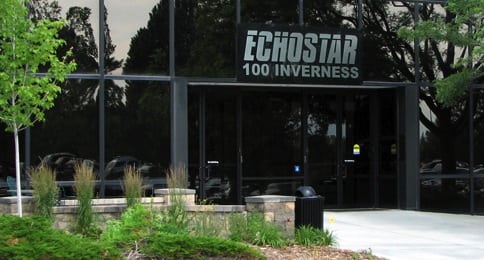EchoStar headquarters in Engelwood, Colorado. Photo: EchoStar
In EchoStar Corporation’s first financial results after merging with Dish Network, the company disclosed that it has “substantial doubt about its ability to continue” without additional funds.
According to EchoStar’s 10-K filing, the company does not have enough cash on hand and/or projected future cash flows to fund a November 2024 debt maturity and subsequent interest on outstanding debt.
CFO Paul Orban addressed the going concern disclosure in a Friday call with investors, noting that the company is pursuing a range of operating and financing plans to resolve it.
“We are in active discussions with numerous parties to secure committed financing to meet our future obligations and have received significant inbound interest from reputable counterparties looking to provide such financing in various forms and at various positions in our capital structure, all which we are carefully evaluating. If sufficient financing is committed, the going concern qualification will be alleviated,” Orban said.
EchoStar President and CEO Hamid Akhavan said the company has an operating plan for 2024 to reach positive operating free cash flow, which includes reducing operating expenses by $1 billion through “synergies and other cost measures.”
EchoStar completed transactions in January as part of this plan to transfer some of Dish Network’s spectrum licenses to a newly formed subsidiary.
Akhavan said the company launched two exchange to address near-term debt obligations and to reduce overall debt exchange, but the company’s existing investors did not accept the offers. “While discussions with some stakeholders are ongoing, we are prepared to continue good faith discussions with all of our stakeholders and arrive at solutions that are in the best interest of the company and all involved parties,” he said.
2023 Financials
EchoStar reported 2023 results on Feb. 29, the first quarterly report after the Dish Network merger. EchoStar presented the finances as if the companies were consolidated for the entire year.
The combined company reported total revenue of $17 billion, compared to $18.63 billion in 2022. The decrease in revenue was primarily from subscriber declines in the Pay TV segment.
Net loss was $1.7 billion, compared to net income of $2.48 billion in 2022. The net loss in 2023 was primarily attributable to a non-cash impairment to goodwill totaling approximately $758 million, and an adjustment to the carrying value of the 800 MHz purchase option totaling approximately $1.8 billion.
The combined company’s business segments are Pay-TV; Retail Wireless, which includes Boost Mobile; 5G Network Deployment; and Broadband and Satellite Services.
Pay-TV is by far the largest segment and generated $11.6 billion in 2023, a 7.5% decrease year-over-year. The company ended the year with 8.53 million Pay-TV subscribers including 6.47 million DISH TV subscribers and 2.06 million SLING TV subscribers.
Satellite Broadband Business
The Broadband and Satellite Services is smaller than Pay-TV and Retail Wireless, but larger than 5G Network Deployment. The business generated $1.76 billion in 2023, down 14% year-over-year.
EchoStar ended 2023 with 1 million broadband subscribers after shedding 59,000 subscribers in the fourth quarter. The company lost 224,000 subscribers during the year, which it attributed to capacity limitations, competition from satellite competitors and focusing on more profitable subscribers.
Subsidiary Hughes Network Systems has been capacity constrained on the U.S. broadband business for years before the Jupiter-3 satellite launch, and the satellite is now in service.
“This satellite provides significant additional capacity, allowing us to be more competitive and responsive to customer demands for greater speeds and higher data allowances. Early feedback from customers is quite positive and will help us reverse the subscriber loss trend of 2023,” Hughes COO Paul Gaske said.
Gaske said the company expects a gradual shift in broadband revenues to shift from consumer to enterprise. Hughes expects enterprise revenue to surpass consumer revenue for the first time in 2024. Hughes ended 2023 with a multi-year backlog of approximately $2 billion.
